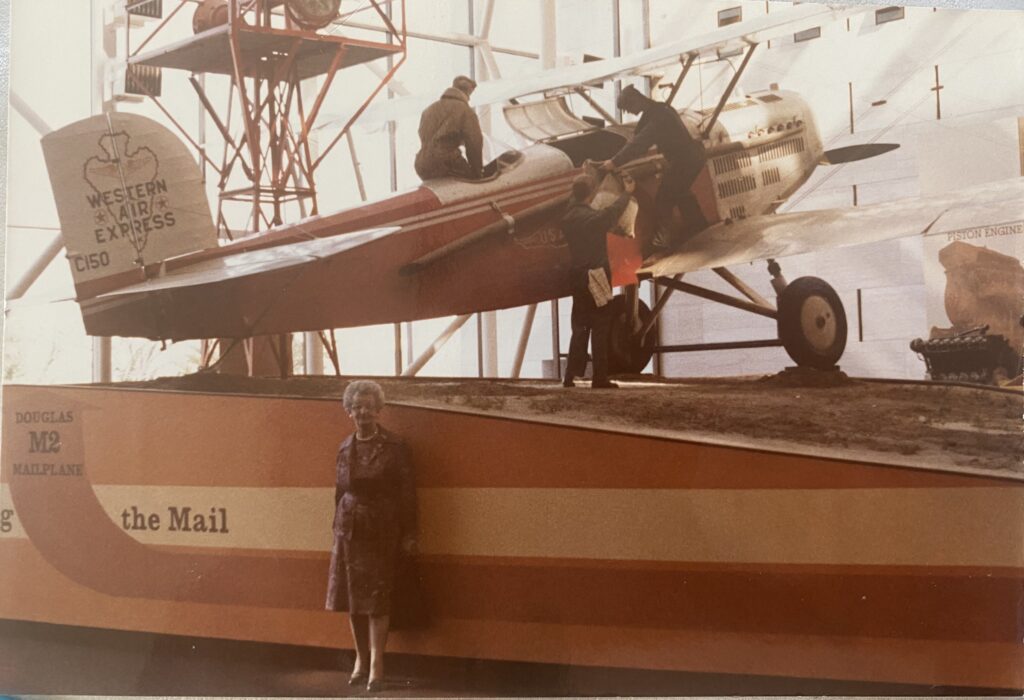The Story of Evlyn Dorn
Rose Marie Woods was Richard Nixon’s longtime executive secretary. But Nixon’s actual “right-hand man” was Evlyn Dorn, a quiet, determined, adventurous woman who was with Richard Nixon and his family from 1937 until her death six decades later.
Evlyn was born in Vancouver, British Columbia, Canada, in 1900. After graduating from high school in 1914, she immigrated to the United States in 1916 to pursue a career as a secretary. Her high school diploma rated her as “excellent” in Housewifery and “good” in both Cooking and Theory. But like all the women in Nixon’s life, Evlyn was independent; she was single and spirited. Once she made her way to Los Angeles, she completed the “regular Course of Study and Practice as prescribed in the Shorthand and Typewriting Department” at Woodbury College on March 1, 1918.
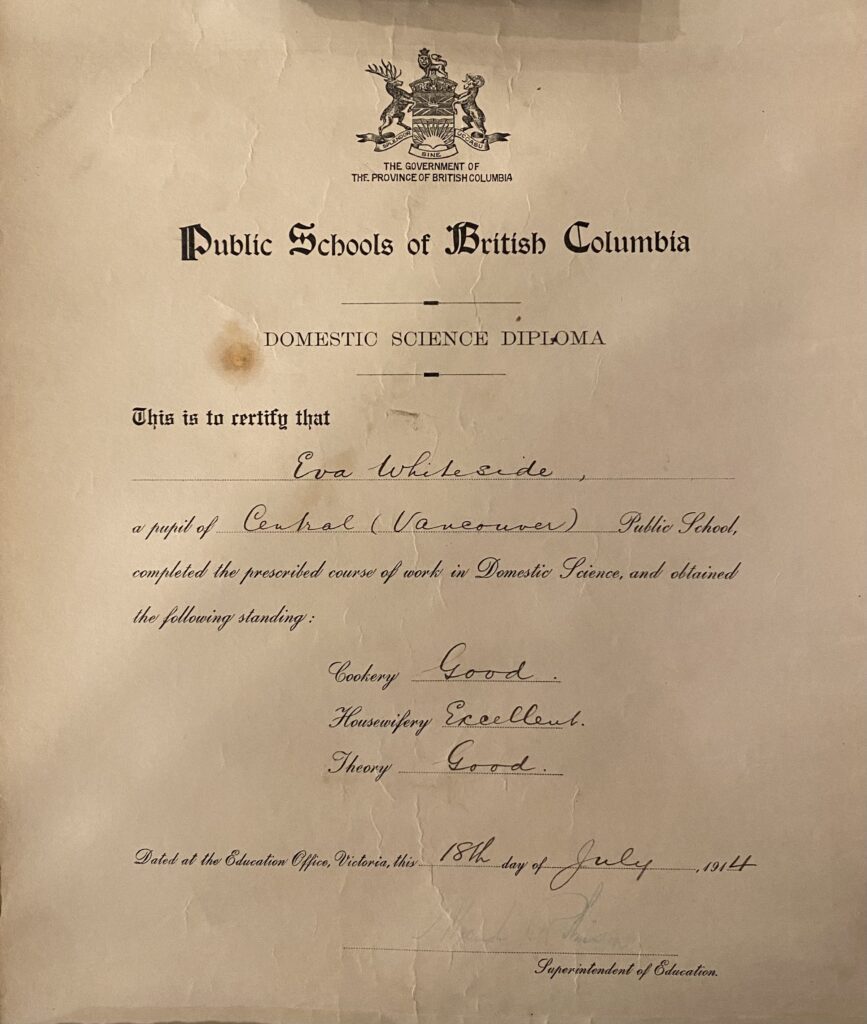
Evlyn initially took a position at Bartlett Music Company in Los Angeles, then moved to Seattle, where she worked for a publishing company and a tire manufacturer, before returning to Los Angeles to work for attorney Ernest Noon as a legal secretary. Ultimately, she found her way to Wingert & Bewley in Whittier. It was there that she met Richard Nixon in 1937, when he was hired on as a brand-new attorney.
Evlyn’s first impression of Nixon was that he was “very punctual, very correct, and neatly dressed in a blue serge suit. He looked the part.” She became Nixon’s secretary, taking down his dictation as he paced behind his desk. Evlyn recalled, “I have taken dictation from lots of people, but I have seldom run across his equal in vocabulary and fluidity of argument.”
Evlyn and Dick became close during the years that Nixon practiced law in Whittier, between the summer of 1937 and December 1941. When Pat and Dick got engaged, Evlyn and her husband, Larry, celebrated with them at Earl Carroll’s nightclub in Hollywood. After Nixon’s venture into private enterprise with Citri-Frost, a pioneer in frozen orange juice, ultimately failed, it was Evlyn with whom Nixon sat in the parking lot of the First Friends Church, pouring out his heart over the failure of his one and only business venture. When Dick joined the U.S. Navy after World War II commenced, Evlyn joined his family at Union Station to see Dick and Pat off for their train ride to San Francisco, where Ensign Nixon would embark on the SS President Monroe to fight the Japanese in the South Pacific.
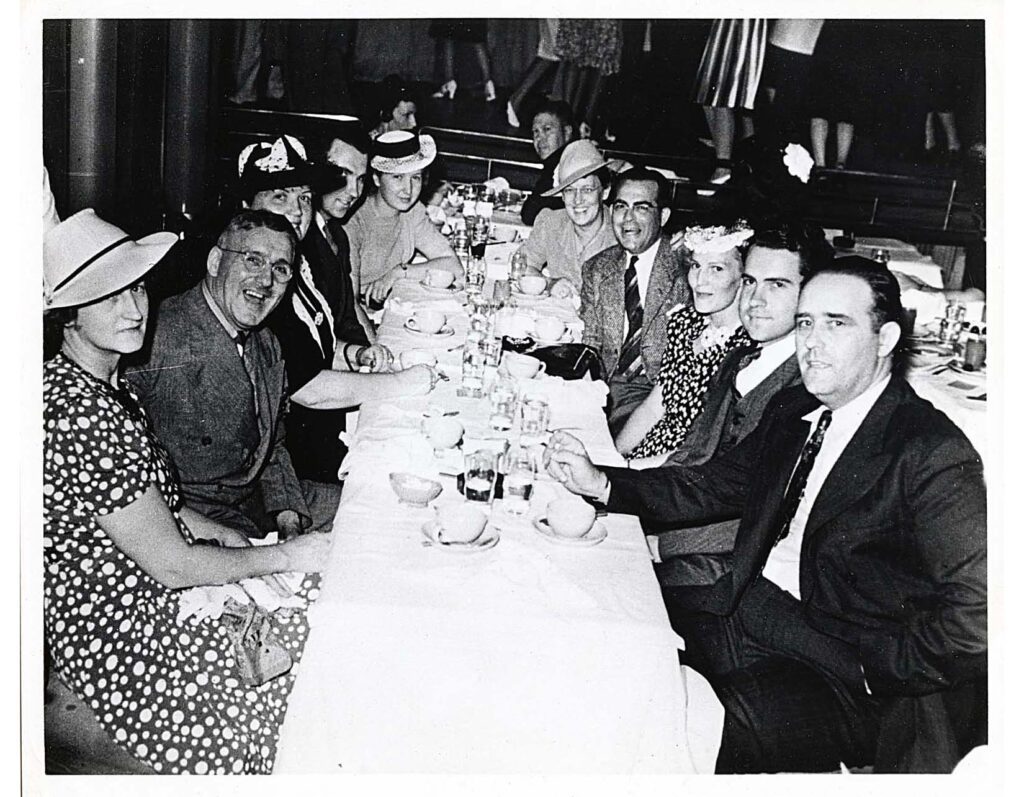
After the war, Nixon returned to Whittier to run for Congress in 1946, defeating five-term incumbent Jerry Voorhis. Evlyn, still with Bewley’s office, volunteered on that first campaign, which was very much an amateur affair and essentially a three-woman operation. While Dick campaigned during the day, Pat worked the campaign office as Hannah watched newborn Tricia. Dick visited Evlyn’s home in the evenings so he could practice his speeches, which she faithfully took down in shorthand, helping him craft his message. She even attended his campaign appearances, recording them for later review.
Once Dick defeated Voorhis and headed east to serve in Congress, Evlyn volunteered as his West Coast assistant. As Nixon’s girl Friday in Whittier, she developed close relationships with his family as well, as she assisted his parents, Frank and Hannah, and his brother Don as a secretary of sorts.
Pat and Dick invited Evlyn and her young daughter, Roberta, to visit in Washington, DC, even meeting them at the train station. While there, Evlyn immediately began to develop close relationships with Dick’s staff, even sending them avocados after her return to Whittier.
Evlyn volunteered on Nixon’s successful campaign for reelection to Congress in 1948 and again on his 1950 Senate race. Yet Nixon did not take Evlyn for granted and insisted she be compensated for her work on his Senate campaign. Between September 20 and the November 7, 1950, election, Evlyn worked 171½ hours for Nixon’s Senate campaign at the rate of $1.50 an hour, for a whopping $257.25. Evlyn, serving as Campaign Committee secretary, was a key member of the campaign, so much so that the day after Nixon won the Senate election, the campaign sent Evlyn a resolution “signed” by Nixon’s opponent, Helen Gahagan Douglas, declaring:
Whereas, Mrs. Evlyn Dorn has donated all her waking hours to the election of Senator Nixon, and
Whereas her house has accumulated considerable debris in the interim.
Now Therefore, we the undersigned agree to take a carpet sweeper, dust rag, vacuum and Vano in hand and do something about it.
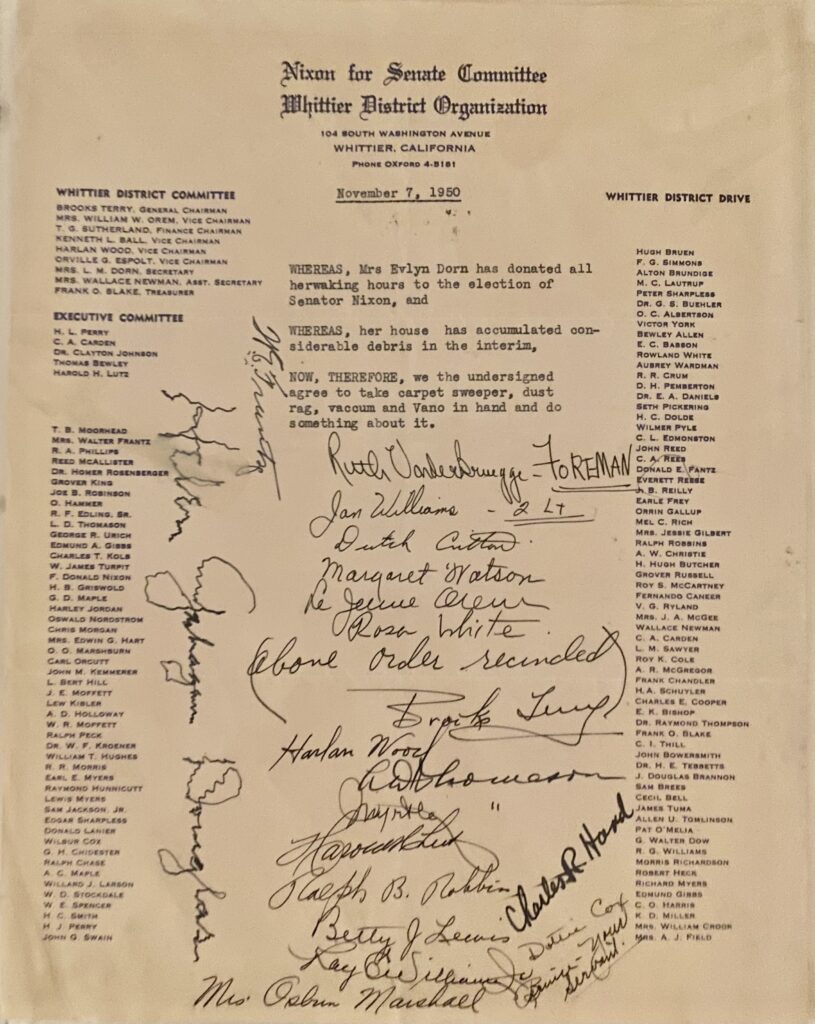
Nixon himself told Evlyn, “On all sides, people were high in their praise of everything that you did and that is something that seldom happens in any campaign.” He then joked that he was sending her an autographed picture because “it is something key people in any campaign get from the candidate, whether they want it or not!”
Evlyn and the Washington, DC, office were in frequent communication, mainly through letter writing. Evlyn and Nixon’s staff took to closing their correspondences with the intimate salutation “Love” as opposed to the more formal “Sincerely.”
As Richard Nixon’s West Coast representative, Evlyn handled mundane matters such as arranging to have Nixon’s favorite fountain repaired, dealing with local hotels that offered accommodations when Nixon came west, and responding to inquiries from Californians regarding Nixon while also responding to correspondences and requests from Nixon’s Washington office.
Evlyn was dedicated to Nixon because she was convinced of his abilities. She was known to declare, “I believe as firmly as I believe anything that Dick Nixon is a future president of the United States. And I think he is going to make one of the best presidents the country ever had!”
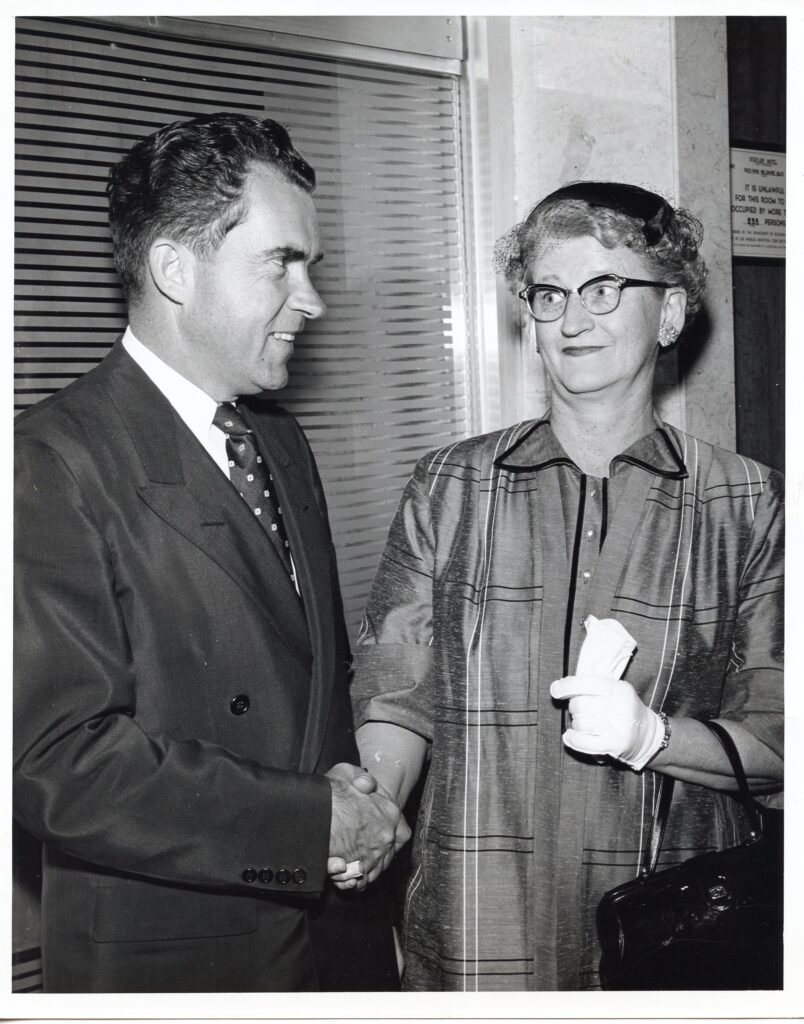
In 1952, when Gen. Dwight Eisenhower selected Dick as his vice-presidential running mate at the GOP convention, Evlyn was there. She staffed the Eisenhower-Nixon Campaign Committee office on Greenleaf Avenue in Whittier and worked with Whittier College to develop a campaign letter on behalf of Nixon’s professors Charles Cooper (a Democrat) and Wallace Newman (a Republican). Taking a page from Nixon’s first campaign, when he successfully campaigned in homes with coffee hours, she worked to develop a Coffee Hour with Eisenhower program with fellow supporter Ms. Valley Knudsen. She even authored her own campaign literature on behalf of the Eisenhower-Nixon ticket. And when a rabble-rouser tried paying students to disrupt Nixon’s speech at Whittier College, Evlyn worked with the chief of police to make sure there was no trouble.
All the hard work paid off, and when Richard Nixon was sworn in as vice president in 1953, Evlyn was there, staying a week at the luxurious Shoreham Hotel at a total expense of $81.24. Considered a member of Nixon’s “family,” Evlyn sat in the vice president’s row of the U.S. Senate Chamber for the first session of the Eighty-Fifth Congress.
Throughout Richard Nixon’s term as vice president, Evlyn continued as his “point man” on the West Coast. Her responsibilities increased to taking calls daily on behalf of Nixon and sorting through various unsolicited constituent proposals, determining which to forward to the Vice President’s Office. She drafted correspondence for Frank and Hannah Nixon and kept Dick’s office up-to-date on his parents’ health and activities. When the couple bought a new home on Beach Boulevard, Evlyn wrote to Nixon’s executive secretary, Rose Mary Woods, promising that Rose would “love that way it snuggles along the orange and lemon trees.” She continued, “[It] is just the kind of home you would like to ring the front doorbell, and see Mrs. Nixon open the door for you. It really looks like home.”
With Frank and Hannah’s move, it was Evlyn who determined Nixon’s new polling place so he would know where to vote. During Dick’s visits home, Evlyn arranged meetings with prominent Republicans. Afterward, she liked to drop a note to Rose Mary Woods telling her how much she enjoyed seeing “The Boss” on his visits, and she also provided her lists of Whittier locals to be written thank-you letters.
When Pat and Richard were on their first Far East goodwill tour on behalf of President Eisenhower, Pat thought to send Evlyn’s daughter, Roberta, a postcard to let her know they were thinking of her as they “travel in far away lands.” After the Nixons completed their tour, Roberta wrote a school report documenting the vice president’s trip, which Evlyn proudly shared with Nixon. Impressed, Dick inscribed the title page, “To Roberta Dorn with congratulations on a splendid paper which brought back some pleasant memories.” Evlyn beamed with joy as she subsequently told Nixon that Roberta had earned an A on the project.
In 1953, when Nixon aide Bill Arnold was appointed to lead the Insular Division of the Interior Department’s Office of Territories, Evlyn was one of the first to write and congratulate him. Evlyn thoughtfully discussed personnel issues within the Nixon office, including when young women, such as Priscilla Everts from Whittier, were hired in the Washington office (with Evlyn promising to steal away in Priscilla’s truck for her move back to Washington). As always, she kept the office apprised of how Frank and Hannah Nixon were getting along as they aged. Letters ranged from updates on how much Dick’s father had enjoyed a recent visit to the various infirmities family members were suffering and always commented on how the family looked forward to Dick’s next visit.
On June 12, 1954, Evlyn sat with Frank and Hannah at Whittier College as Dick gave the commencement address. She and Nixon’s parents all beamed with pride as Nixon told the audience, “Every year since graduation I have had a deeper appreciation of the privilege, shared by only ten percent of my contemporaries, of being able to go to college at all. With that appreciation has developed a growing awareness of the sacrifices my parents made to send me to college.”
That same year, Dick invited Evlyn to assist with his nationwide campaign on behalf of Republicans in the midterm elections. Air travel was still relatively new, but Evlyn jumped at the chance to be his campaign secretary, telling Rose Mary Woods, “I hope that you will be on hand when I join this exciting hop. I can hardly stand the waiting, and really appreciate this wonderful opportunity. I feel very lucky, and very privileged to be able to go on any part of this. If you have any of the details, I wish you would advise me, as I feel like I used to wait for Christmas to arrive, the feeling of excitement and thrill, that I almost feel as if I shall ‘blow a cork’!”
On October 13, 1954, they flew from Los Angeles to Houston, then on to Washington DC, flying through Hurricane Hazel. From DC they were off to Philadelphia, then they returned to DC before heading to Chicago. This was followed by campaign stops in Champaign, Peoria, and Rock Island, Illinois, before departing for Billings, Montana, with stops in Bozeman and Butte. En route to Cheyenne, Wyoming, their aircraft circled Mount Rushmore, and then they were off to Salt Lake City, where Evlyn was reminded of her first adventure flying.
Back in 1926 Evlyn’s sister Dede had worked for Western Air Express, a pioneer in aviation that carried mail from Los Angeles to Salt Lake City, with one stop in Las Vegas. Dede arranged for Evlyn to fly with her in a Douglas N-2 biplane on the mail route from Veil Field in Montebello, a simple airstrip with only a small shed and a windsock. The biplane had no creature comforts; Evlyn sat on the mail sacks in the open pit. Western Air had the legendary pilots Fred Kelly, Jimmy James, and Maury Graham, who worked the route in shifts. Kelly landed in Las Vegas, where James took over for the leg to Salt Lake City. The flight was very cold, with Evlyn wearing a warm, heavy black suit on loan from Sid Grauman of the Chinese Theatre.
Whenever the pilot wanted Evlyn to see a point of interest, he’d tip the plane from side to side to get her attention, upon which she could reach back to him to receive a note explaining the view below. Air travel was so premature that the pilots were teased after landing because their faces were blackened from exhaust fumes from having to look over the side of the cockpit while flying.
Over sixty years later, Evlyn described the return flight back to California: “I became a little air sick, and the pilot landed the craft on the desert floor, we three got out and walked around for a while, then flew on home to Los Angeles.” Revealing her sense of humor, she added, “I always say, ‘Western Air Express had excellent concern for its passengers.’” Later, when she learned that after pilot Maury Graham had been lost on a flight, his body had been found with the mailbag still beside him, she commented, “This is real dedication to one’s work, isn’t it?”
Now, in October 1954, Evlyn was visiting Salt Lake City as a member of the vice president’s staff on a campaign tour across the United States. She reflected on that earlier flight as she emerged from their large charter plane: “I thought of my first air experience in the Douglas N-2 with Western Air Express, a thrill which shall live forever in my memory.”
After Salt Lake City, the campaign tour continued to Las Vegas, where Nixon and the staff took in the late-night show with Marlene Dietrich. Then they were off to Phoenix, followed by Pocatello, Idaho, before spending the night in Boise. The tour continued on to Corvallis and Portland, Oregon, turning south to Millbrae, California, then San Francisco, Long Beach, and San Diego before returning overnight to Los Angeles. After crisscrossing Southern California, including stopping to have lunch with Frank and Hannah in Whittier, the campaign tour headed north to San Francisco, Spokane, and Seattle. Nixon’s entourage then departed for Washington, DC, while Nixon arranged for a limousine to take Evlyn to the airport to be reunited with her family in Los Angeles. Evlyn was over the moon at her experience; her final comment on the tour was “What a lucky person I am!”
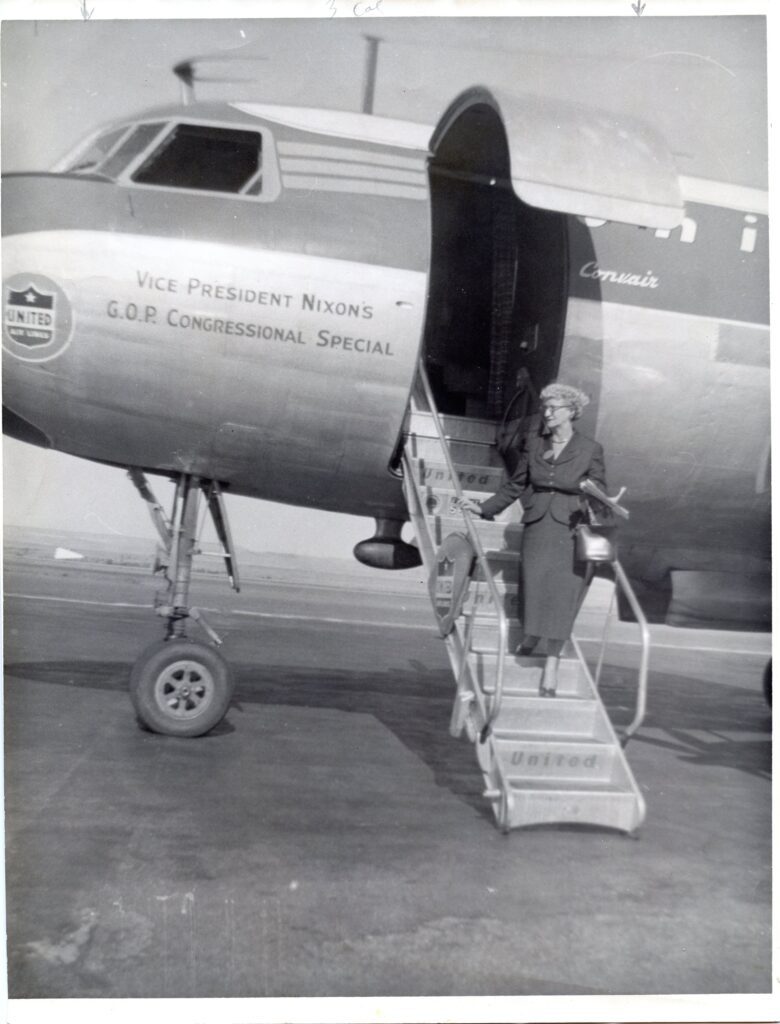
Evlyn often developed friendships with individuals who contacted her to inquire about Nixon or request his assistance, and she corresponded with them throughout the years. In 1955 the family of Dr. Leslie Karady requested Evlyn’s assistance regarding their immigration status. Not only did Evlyn assist the Karady family on behalf of Nixon, but they soon began exchanging Christmas cards and personal letters, which continued for the next thirty years, until Leslie’s death in 1985.
Evlyn never wavered in her conviction as to Nixon’s future political success, and she diligently worked to preserve the history of his endeavors. When not working on behalf of campaigns or taking care of local constituent needs, she undertook tasks such as contacting the Southern Pacific train line to preserve copies of the menus from Nixon’s whistle-stop train tours. Evlyn and Hannah enjoyed dutifully collecting all newspaper clippings about Nixon to create family scrapbooks. And she continued to work as the personal assistant for Frank and Hannah Nixon and Richard’s brother Donald as well.
As Frank Nixon grew older, Dick sent Evlyn $100 and asked that she buy a dictation machine to help his father record his favorite stories, as Nixon wanted to preserve his history. Unfortunately, Frank’s health deteriorated before he could record any of his tales. After Frank Nixon passed away in 1956, Evlyn became even closer to Hannah. At the convention, Evlyn joined Hannah, Julie, and Tricia, along with Austine Hearst and Betty Blake, in celebrating one hundred years of Republican First Ladies in America.
Around 1960 Nixon sent Evlyn funds to select a new birthday dress for Hannah and enclosed a card to go with her gift, as Evlyn was the only non–family member with whom Hannah would celebrate her birthday. When Pat and Dick’s daughters, Tricia and Julie, attended camp in Santa Barbara, it was Evlyn who drove Hannah up to see Julie’s performance as Amy in Little Women and returned to Whittier with the girls so they could all attend the Republican National Convention together. There Dick was selected the Republican nominee for president.
As the 1960 campaign came into full swing, Hannah, now seventy-five, received so many calls that her telephone was rewired to Evlyn’s home so Evlyn could act as her gatekeeper. This was a role that Evlyn took seriously. When Hannah’s sister Martha Gibbon met a reporter at a Democrats for Nixon rally and brought him back to Hannah’s house for an interview, Martha warned, “We’ll have to hurry Hannah, before Dorn finds out he’s here.” The reporter reflected, “We chatted, nibbling on hot ice-box cookies, until Mrs. Gibbon, restless about Dorn discovering our conspiracy, urged me out,”
Nixon lost the campaign for president but never forgot Evlyn’s contributions. On November 8, 1961, Dick wrote to Evlyn, “As I looked at my desk calendar this morning, it seemed hardly possible that a year had gone by since our campaign of 1960 came to a close. I would not want this day to pass without taking the opportunity to tell you again how deeply grateful I am for all that you did for our cause. No candidate for the Presidency could have had a more dedicated and loyal group of supporters.”
By 1961 Don Nixon had moved to Newport Beach. Hannah remained in Whittier, where Evlyn continued to look after her, even after she eventually had to move into a nursing home. After Hannah passed away in 1967, Dick wrote to Evlyn, “This is just a note to tell you how much we all appreciate the work you have done far beyond the call of duty in connection with the funeral services for my Mother. Through the years you have been of great assistance to our family in more ways than I can recount and we are most grateful.”
When Nixon was nominated for president at the 1968 Republican Convention, Evlyn was there. Working to get Richard Nixon elected president became a family affair for Evlyn and her daughter, Roberta. After the convention, Evlyn told Don’s wife, Clara Jane, how much Roberta wanted to work on the campaign. The next thing Roberta knew, Ed Nixon called from New York and asked her to come east to help him.
When campaign headquarters were opened in Whittier, Evlyn gave of her time staffing the office and also contributed financially to the campaign. On the East Coast, Roberta managed the telephone lines and dutifully logged all calls that came in. Her final entry on November 2, 1968, noted simply, “Watch polls in Illinois.” On election night 1968, Roberta celebrated President-elect Nixon’s victory in Dick and Pat’s hotel suite. In the months that followed, Evlyn worked from Whittier, while Roberta was in Washington arranging for over two hundred of Nixon’s friends and family members to attend his inauguration.
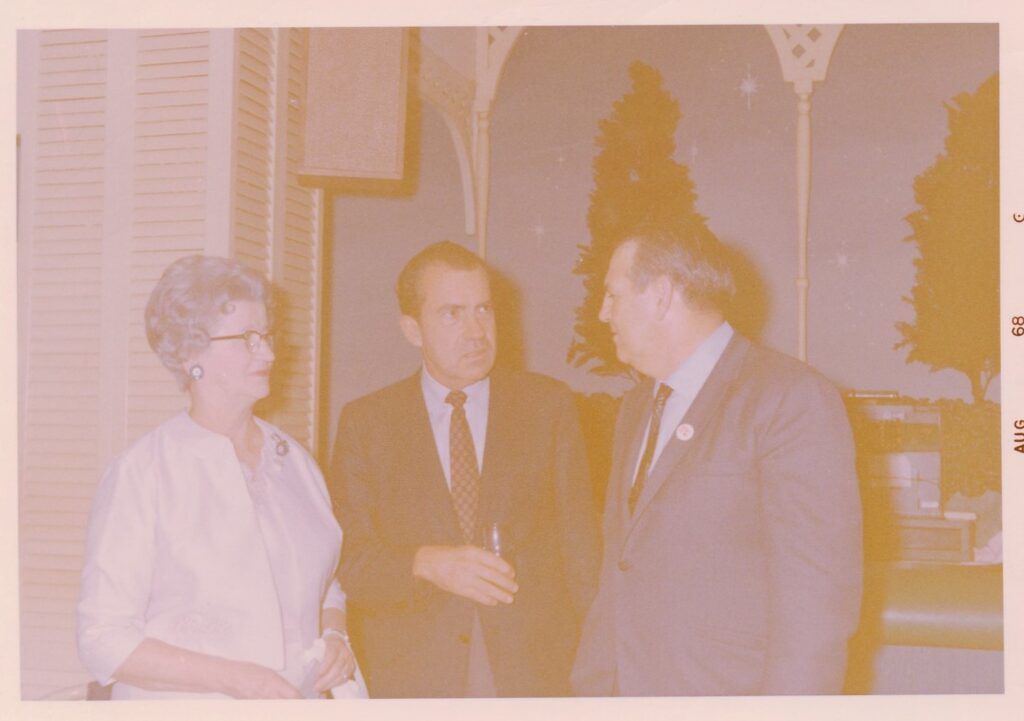
Roberta loved Washington, DC, and in appreciation for her hard work, she was offered a position with the Republican National Committee. But she was committed to juvenile justice and instead took a position in the Justice Department, where she remained until her retirement in 2004.
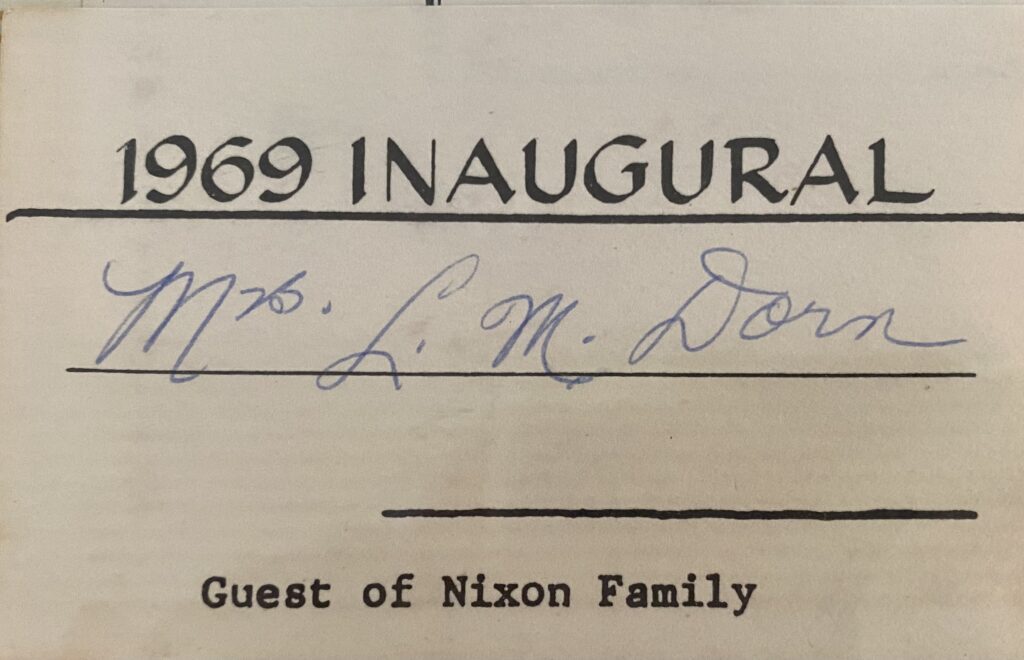
Back in Whittier, the extended Nixon family threw a party for Evlyn on March 10, 1969, in honor of her years of dedication. Olive Mashburn, President Nixon’s aunt, honored Evlyn:
Once upon a time a baby girl was born in a faraway country—British Columbia. She was a pretty little girl and grew up to be a very pretty woman. She learned to read and to write and even to type. She could do that so well that she decided to do it for money.
She got a job with a young attorney. He expected to get full value for his money- and he got it. But she liked it. She liked to work for him, even though he was an exacting task master.
Then this young lawyer got into politics. So she cheered him on and pled his cause when he ran for office and backed him up in every one of his efforts.
Then—when this young attorney won the honor of becoming the president of these United States, she was proud of him and felt repaid for her efforts on his behalf through the years.
She took on a job of figuring out the relationship between him and all of the relatives—far and near—seeing that they received invitations to the various events, checking on their exact relationship to him, if and when they expected to go to Washington. Then followed innumerable telephone calls to New York—later to Washington. Two or three telephones at Don’s office, where she was stationed, were ringing much of the time, relatives asking, when do we get our invitations? What should we wear to this or that function? Even how much was it all going to cost? Really, we relatives are deeply grateful to you, Evlyn, for your many, many hours of telephone calls, letters in answering questions and want to say so in this more tangible away—on this important day.
The family then presented Evlyn with a beautiful ring that Clara Jane had picked out, a gold ring with a pearl cluster. This was significant in that Quakers do not ordinarily give jewelry.
In 1970 President Nixon invited Evlyn’s daughter, Roberta, to attend the White House reception for President Georges Pompidou of France. Following the reception, Nixon arranged for a military escort to make sure Roberta arrived home safely.
Months later, when Evlyn’s husband, Larry, died in November 1970, President Nixon stopped what he was doing at the White House and wrote Evlyn in longhand: “Dear Evlyn, I want to express my deepest sympathy to you and to the family during this sad period. Larry was one of my favorite people. He was always upbeat—never failing to give those around him a light—regardless of how tough the going might be. I honor how close he was to you and how much you will miss him. You can take great comfort in the fact that no man ever had a more loyal and devoted wife. Sincerely, Dick.” The first bouquet of flowers delivered to the funeral home handling Larry’s services was from the White House.
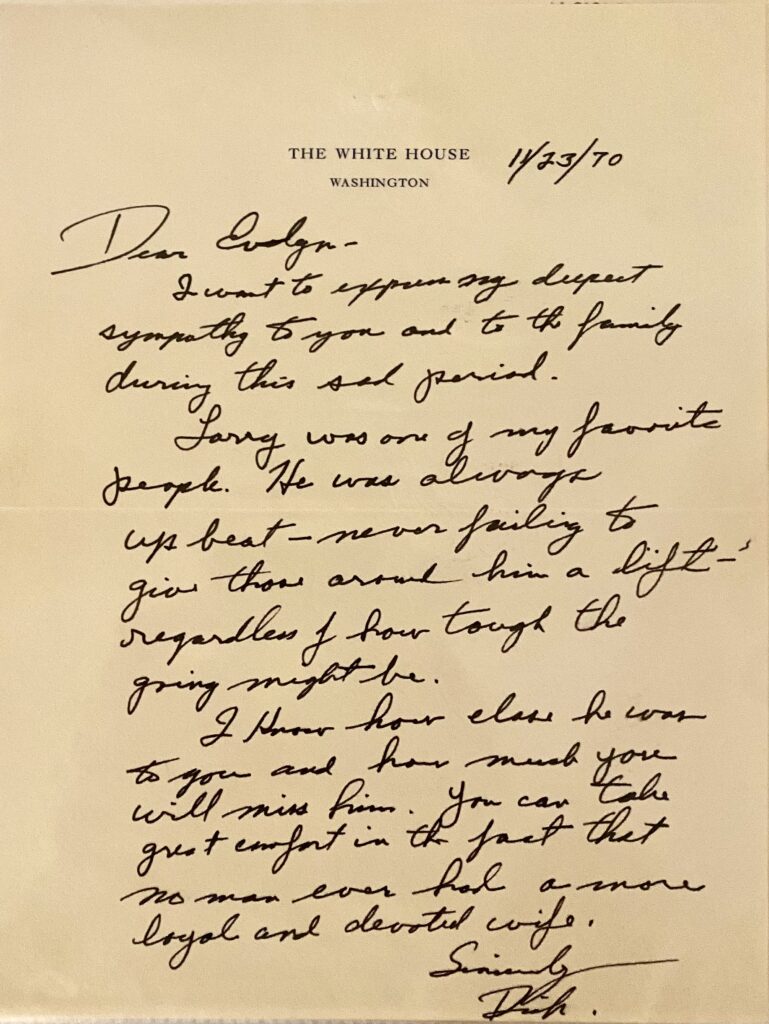
Just a few months later, while President Nixon was visiting Ottawa, Ontario, Canada, he made reference to Evlyn in his toast to Gov. Gen. Roland Michener. Although now in her seventies, Evlyn continued to work for Dick Nixon. Whittier College sought to take oral histories of Nixon intimates, and Evlyn spent untold hours at Don Nixon’s Newport Beach home, organizing materials for the oral histories. She also prepared family records for the anticipated Richard Nixon Presidential Library.
When Watergate hit and even Rose Mary Woods was under attack, Evlyn wrote to her to express her support. In response, Rose Mary wrote to Evlyn, “The recent situation which has confronted me and still seems to dog my heels, has been, as you can imagine, a frightening and embarrassing one. The wonderful words of encouragement and understanding which I have received from dear friends like you are most helpful to me than you will ever know, and I just want to tell you how grateful I am for your very thoughtful message.” Less than two months after Nixon resigned the presidency, Evlyn wrote to Dick:
I have chosen this time to thank you for the many, many fine things you have done for the American people.
Among my cherished memories are the early years at the Whittier law firm, where you, the young attorney practiced law and I, privileged to be secretary, the everyday work, the ice-skating on Thursday evenings with you and Pat, the spaghetti dinners at your apartment in Hacienda just after you two were married.
Reflecting back, my association with your mother was a warm and wonderful experience. She was a proud lady and all who met her were touched.
Later the years I spent with Don, who is such a good friend, have been exciting and interesting.
Working with Ed on the Nixon Oral History Project through Whittier College was very rewarding, and I wish you had time to read some of the personal interviews we had where so many express their admiration and gratitude to you.
I am sure you know there are millions of us who love and admire you and Pat.
With best wishes for a full recovery, I am Sincerely, Evlyn Dorn
On Christmas 1975 Nixon told Evlyn of his gratitude for her: “As the year 1975 comes to an end, I want you to know how deeply I have appreciated your loyal friendship and support over the years. Only during difficult periods does one learn who his real friends are. I am grateful that you have always been in that group. Pat joins me in sending our best for Christmas and the New Year.”
In 1979 Pat and Richard Nixon donated keepsakes and memorabilia given to them to Whittier College. The collection consisted of items presented to the Nixons on visits with public figures and on special occasions during Dick’s years in public office. Evlyn happily reported how the college exhibited the items, and Dick responded, “Your letter brought back many pleasant memories. I am glad that the college has done such a good job displaying the mementos.” On a personal note, he added that all of his and Pat’s grandchildren were “healthy and wise if not wealthy!”
When Evlyn turned eighty-five in 1985, in addition to writing her himself, Nixon arranged for his friend President Ronald Reagan to send her a personal letter wishing her a happy birthday. But Evlyn’s most cherished memento was a framed picture of Pat and Dick, on which Nixon wrote, “To Evlyn Dorn with grateful appreciation for her loyal friendship over the years from Dick Nixon 10/2/75.” Her last few years were spent in a nursing home, and the photograph proudly hung on the wall of her room. Evlyn passed away on April 26, 1992; Pat Nixon followed her on June 22, 1993; Dick Nixon joined them the year after that, on April 22, 1994.
A wonderful footnote to Evlyn’s life is that in 1988 she visited the Smithsonian Air and Space Museum in Washington, DC, where she discovered that the Douglas N-2 biplane from her mail run with the Western Air Express in 1926 was on permanent display.
